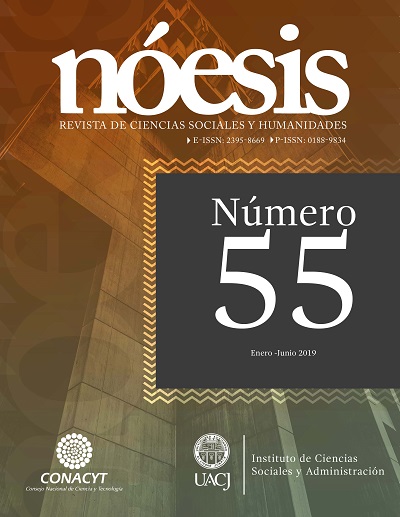Quantitative and qualitative impact of GDP on sport performance and its relation with corruption and other social factors
Main Article Content
Abstract
Downloads
Article Details

This work is licensed under a Creative Commons Attribution-NonCommercial-ShareAlike 4.0 International License.
References
Boscá, Emilio, Vicente Liern, Aurelio Martínez and Ramón Sala. 2009. Increasing offensive or defensive efficiency? An analysis of Italian and Spanish football. Omega 37 (1): 63-78. http://dx.doi.org/10.1016/j.omega.2006.08.002
Carmichael, Fiona, Dennis Thomas, and Robert Ward. 2000. Team performance: the case of English premiership football. Managerial and Decision Economics 21(1): 31-45. http://dx.doi.org/10.1002/1099-1468(200001/02)21:1<31::AID-MDE963>3.3.CO;2-Q
Churilow, Leonid and Andy Flitman. 2006. Towards fair ranking of olympic achievements: the case of Sydney 2000. Computers and Operations Research, 33(7): 2057-2082. http://dx.doi.org/10.1016/j.cor.2004.09.027
Davis, Michael and Christian End. 2010. A winning proposition: The economic impact of successful National Football League franchises. Economic Inquiry, 48(1): 39–50. http://dx.doi.org/10.1111/j.1465-7295.2008.00124.x
End, Christian, Beth Dietz-Uhler, Elizabeth Harrick and Lindy Jacquemotte. 2002. Identifying with winners: A reexamination of sport fans’ tendency to BIRG. Journal of Applied Social Psychology, 32(5): 1017-1030. http://dx.doi.org/10.1111/j.1559-1816.2002.tb00253.x
Flegl, Martin. 2014. Performance analysis during the 2014 FIFA World Cup qualification. The Open Sports Science Journal, 7: 183-197. http://dx.doi.org/10.2174/1875399X01407010183
Flegl, Martin and Luis Andrade. 2016. Rio 2016 - Olympic Sport Economic Data. http://dx.doi.org/10.6084/m9.figshare.4272200 (accessed November 30, 2016).
Gorse, Samantha and Simon Chadwick. 2011. The prevalence of corruption in international sport: A statistical analysis. Coventry: Centre for the International Business of Sport. Available at http://www.egba.eu/pdf/Report-FINAL.pdf (accessed December 1, 2016).
Graycar, Adam. 2015. Corruption: Classification and analysis. Policy and Society, 34(2): 87-96. http://dx.doi.org/10.1016/j.polsoc.2015.04.001
Gujarati, Damodar and Dawn Porter. 2004. Basic econometrics. New York: Mc Graw Hill.
Li, Yongjun, Liang Liang, Yao Chen and Hiroshi Morita. 2008. Models for measuring and benchmarking olympics achievements. Omega, 36(6): 933-940. http://dx.doi.org/10.1016/j.omega.2007.05.003
Li, Yongjun, Xiyang Lei, Qianzhi Dai and Liang Liang. 2015. Performance evaluation of participating nations at the 2012 London Summer Olympics by a two-stage data envelopment analysis. European Journal of Operational Research, 243(3): 964-973. http://dx.doi.org/10.1016/j.ejor.2014.12.032
Lozano, Sebastián, Gabriel Villa, Fernando Guerrero and Pablo Cortés. 2002. Measuring the performance of nations at the Summer Olympics using data envelopment analysis. The Journal of the Operational Research Society, 53(5): 501-511. http://dx.doi.org/10.1057/palgrave/jors/2601327
Masters, Adam. 2015. Corruption in sport: From the playing field to the field of policy. Policy and Society, 34 (2): 111-123. http://dx.doi.org/10.1016/j.polsoc.2015.04.002
Müller, Martin. 2015. What makes an event a mega-event? Definitions and sizes. Leisure Studies 34 (6): 627–642. http://dx.doi.org/10.1080/02614367.2014.993333
Potts, Todd. 2014. Governance, corruption and Olympic success. Applied Economics, 46 (31): 3882–3891. http://dx.doi.org/10.1080/00036846.2014.948672
Ramírez, Lucía and Isaac Sánchez. 2013. Crecimiento económico, corrupción e instituciones en México. Nóesis. Revista de Ciencias Sociales y Humanidades, 22 (43-1): 104-133. http://dx.doi.org/10.20983/noesis.2013.1.4
Rio. 2016. Rio 2016 - athletics schedule and results. Available at https://www.rio2016.com/en/athletics-schedule-and-results-download (accessed September 21, 2016).
Tiedemann, Torben, Tammo Francksen and Uwe Latacz-Lohmann. 2011. Assessing the performance of German Bundesliga football players: a non-parametric metafrontier approach. Central European Journal of Operations Research, 19(4): 571-587. http://dx.doi.org/10.1007/s10100-010-0146-7
Transparency International. 2016a. Corruption perception index. Available at http://www.transparency.org/research/cpi/ (accessed October 10, 2016).
Transparency International. 2016b. Global corruption report: Sport. Routledge. ISBN: 978-1-315-69570-9. Available at http://www.transparency.org/news/feature/sport_integrity (accessed November 25, 2016).
Vagenas, George and Eleni Vlachokyriakou. 2012. Olympic medals and demo-economic factors: Novel predictors, the ex-host effect, the exact role of team size, and the “population-GDP” model revisited. Sport Management Review, 15(2): 211-217. http://dx.doi.org/10.1016/j.smr.2011.07.001
World Bank. 2016. World Bank open data. World Bank. Available at http://data.worldbank.org/ (accessed October 15, 2016).
Wu, Jie, Liang Liang and Feng Yang. 2009. Achievement and benchmarking of countries at the Summer Olympics using cross efficiency evaluation method. European Journal of Operational Research, 197 (2): 722-730. http://dx.doi.org/10.1016/j.ejor.2008.06.030

